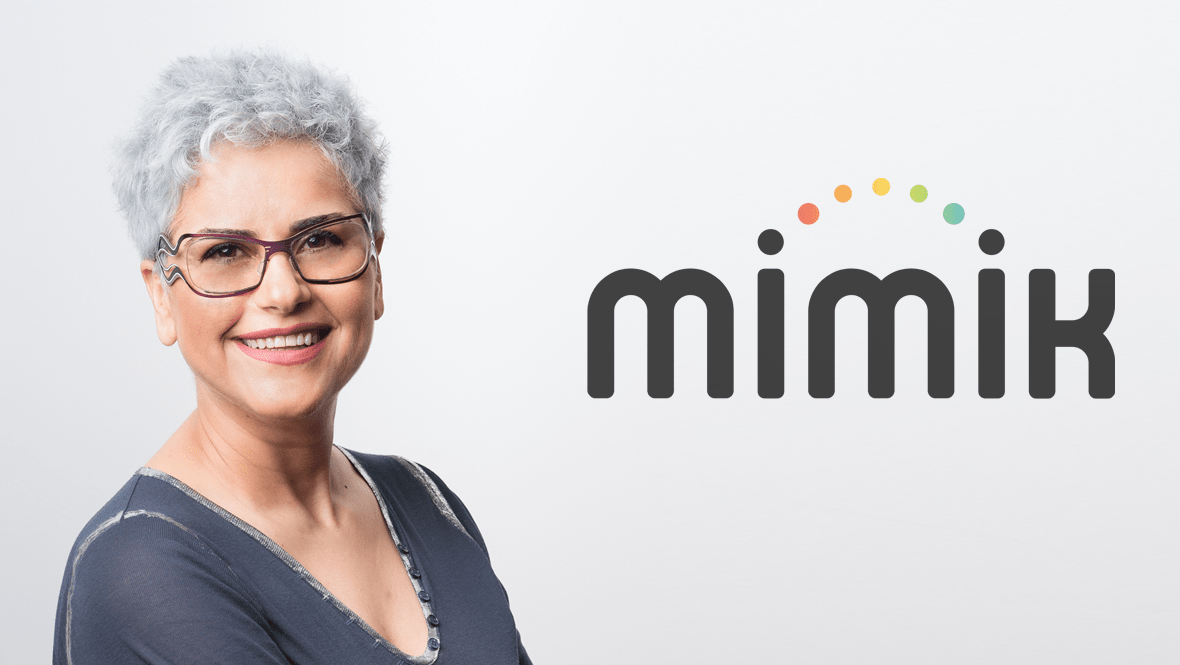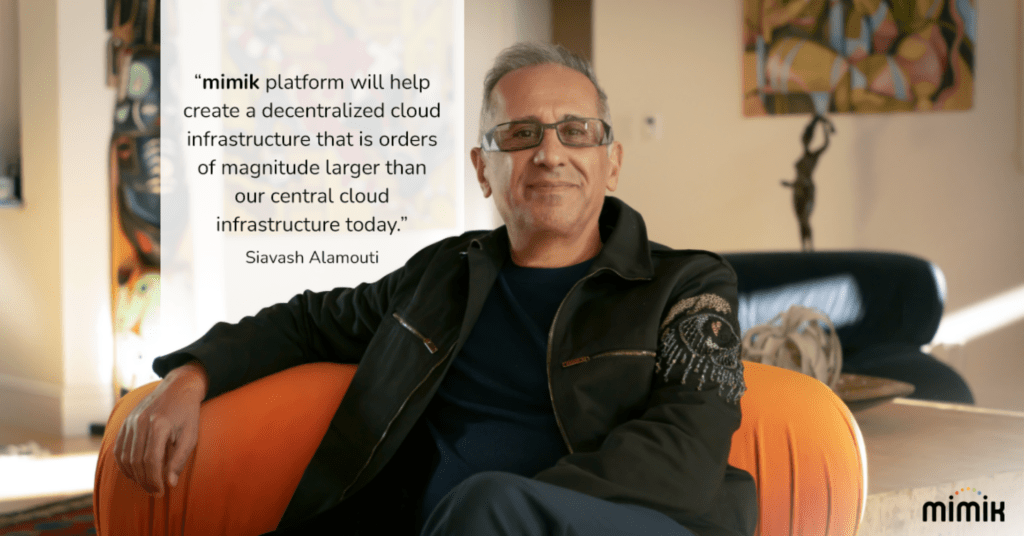Technology has become the fabric of our lives, more impactful than ever in our human history, and decentralization is the necessary foundation that will set it right. More than ever, women have the opportunity to lead this technology evolution with a spirit of collaboration, nurturing and cooperation. Completely aligned with our nature, we must get in the forefront of this technological evolution, unite all women, men, boys and girls to do the right thing for everyone and reverse the status quo that has put our society and planet on the brink of extinction. I’m positive that this is possible and will only happen with our leadership ensuring freedom for all.
I had the pleasure of interviewing Fay Arjomandi the Founder, President and CEO of mimik technology inc. She is a highly sought-after global speaker, and industry thought leader given her specialization in digital communications, software applications, and protocol development. While incubating mimik, Fay was also the CEO of a group of mobile companies under Nantworks, including Tensorcom, NantMobile, and Mobile Genomic Health, leading the consumerization health solutions between 2014–2016. Prior to NantWorks, she was the CEO of Vodafone xone where she successfully launched Vodafone xone in Silicon Valley in September 2011, which became the global incubation center of the Vodafone Group and the beta brand for Vodafone consumers in UK, Italy, Spain, Germany, and Egypt
Most recently, Fay was one of four witnesses invited to the Canadian House of Commons special committee on Industry, Science and Technology to discuss contact tracing apps and mimik’s technology’s unique approach to provide all the benefits of contact tracing without compromising user privacy.
Touted as a pragmatic technology innovator, Fay have been grateful for the recognition she received throughout her career: authoring twelve patents. receiving the distinguished Business In Vancouver’s “Top 40 Under 40” award presented to outstanding leaders in their chosen fields, in 2006. being appointed as the Canadian technology and innovation representative to the White House in 2007 named as one of the most influential women business leaders, in Silicon Valley, by San Francisco Business Week, in 2014, receiving the Concordia Alumni of the Year award in 2018, the co-founder and CEO of three start-up companies: L3 Technology, Mobidia, and Disternet (now mimik technologies).
To stay supportive of social change, Fay continue to write and speak on topics tackling diversity and the inclusion of women in tech, which she feel is starting to take hold but there is still much work to be done. Fay is committed to continue making strides for women in STEM while fulfilling my entrepreneurial spirit.
Thank you so much for doing this with us Fay! Can you tell us a story about what brought you to this specific career path?
Short answer is that it was over a bet. Back in Iran I had no desire to attend university. I couldn’t see the point. I used to argue with my mom, questioning the point of getting a university degree in Iran, where I had no chance to use my education for a rewarding career. In Iran, especially during my generation’s time (first generation of post-revolution kids), women became second class citizens and most had no opportunities besides getting married and having kids. My first aspiration after leaving home and moving out was to become a make-up artist, until I finally ended up in Canada (after living in a couple of other countries) While I was pursuing that in a discussion with a couple of friends, one of them encouraged me to go to university and study engineering and the other one said that I would be wasting my time becauseI was too old (I was 23) and I hadn’t studied for a long time. That got me going. I couldn’t accept anyone telling me that I could not do something, and everything started from there. I went to school and finished my EE in 2 and a half years by taking close to 21 credits in some semesters. After graduation, I worked for a year at MDSI, a software company in Vancouver, where I eventually got bored working on the same thing every day. It was then that I was introduced to the notion of tech start-ups. Once again curiosity kicked in along with my drive for problem solving,eventually getting me on the entrepreneurial path.
Can you share the most interesting story that happened to you since you began at your company?
Can you share the most interesting story that happened to you since you began at your company?I was in a meeting with a couple of my team members and the entire executive team of one of the fortune 500 companies. The discussion was quite interesting. We were getting challenged for our approach and kept pushing alternative approaches that were to some degree against latest technology trends. At some point, I just closed my laptop and said “I respect your opinion. However, I caution you that regardless of mimik I must advise you as a peer to not take this approach because of all the consequences we discussed, but obviously it’s entirely up to you.”To my surprise, the feedback we got was very positive and I later learned that this was a tactic to test us and to see how much we would change our position to win a deal.
Can you share a story about the funniest mistake you made when you were first starting? Can you tell us what lesson you learned from that?
In 1999, when I started my first company, I learned that I can get R&D grants from the Canadian government. I applied for a grant and was visited by one of the representatives for a meeting at my office which was the livingroom of my rental property (the first floor of a house), which I had turned into an office without the owner’s consent! When the government rep came for the meeting, he ended up sitting at the counter of the fireplace in order to see my presentation on my desktop. The presentation went fairly well (needless to say not to my standard today). I had made us coffee as wee agreed on next steps, but he only had a sip of his black coffee. He said he had to leave and didn’t have time to finish his coffee. I poured a cup for myself after he left. As soon as I took a sip, I almost spitted everything out as it was so unbelievably bitter. The moral of the story is that you should always test your products before offering them to your customers.
What do you think makes your company stand out? Can you share a story?
Our brilliant, loyal, committed, trustworthy, and hardworking team at mimik. I now have over 20 years of experience in the tech sector in small, medium and large companies including Vodafone, where I led corporate venture and worked with many of our portfolio companies very closely to bring their product to Vodafone’s markets.
I’m yet to see such a concentration of talent and skillset with drive to move mountains and march in the same direction. We don’t have any “yes” man attitudes. We engage in healthy discussions and challenge each other, but in the end we make decisions and move forward with speed, agility, and cleverness in our approach. The mimik hybrid edge cloud software platform is extremely disruptive and highly scalable with seven layers of security and high data privacy, yet our differentiation is that we abstract the complexity of underlying environment and have kept everything else standard for the developers and entrepreneurs. This could have only been achieved with a great team culture with transparency, honesty and playfulness within a flat organisational structure where everyone treats each other as family. We also keep the same culture with our customers by always giving them honest and reliable answers. If we see that our platform doesn’t fit their need, we tell them. If they need our help, given our knowledge and expertise, we offer it to them. We believe that edge cloud is a massive market that has just started, and we will succeed only if our customers and partners succeed with their products.
Are you working on any exciting new projects now? How do you think that will help people?
mimik is my entire focus these days. I’m committed to my team and our ecosystem customer/partners. Bloomberg stated that edge could be a $4 trillion market. The edge cloud revolution has just started, and we’ve been the frontier in this sector. Edge cloud computing is complex but mimik has made it simple for entrepreneurs and enterprises to innovate and take their share of this huge market opportunity. Application developers can finally do API first and microservice-based development on edge devices that run client agents. This means bringing the workload management and data processing to the closest point to the application demand and the source of data.
I’m passionate about data privacy and the right of data producers to monetize their data. Our data has intrinsic value. I’m excited about our platform empowering data producers whether consumers or small and large enterprises. We allow them to control and manage their data. We have also started a few initiatives to enabe a fairer data economy for data producers.
Ok super. Thank you for all that. Let’s now shift to the main focus of our interview. Are you currently satisfied with the status quo regarding women in STEM? What specific changes do you think are needed to change the status quo?
We have made a lot of strides in the home and at work, but women are still underpaid and under-represented in positions of power and have little access to capital. We need to change this, and it needs to start with women knowing their own power and worth, and demanding and fighting for equal rights.-
In your opinion, what are the biggest challenges faced by women in STEM or Tech that aren’t typically faced by their male counterparts? What would you suggest to address this?
I grew up in the post Islamic revolution in Iran when my life turned upside down overnight with extreme restrictions. There were a lot of things we were told we couldn’t do. As a result, my parents were over-protective, the system was super-restrictive, outdated sexist traditions had become the norm, and schools were run like military camps. I was a free-minded teenager, a tomboy who was into sports, and a rebel without a cause who wanted to live her life the way “she” chose. My life was a daily struggle. The most basic stuff — what I wore, my haircut, the way I walked and talked — was scrutinized and rejected. I fled to Dubai at the age of 17, not knowing anyone or speaking a word of Arabic or English. I lived day to day, maintaining face, not wanting to ask for help from anyone, including my family. I then lived the life of a refugee and immigrant in many different countries where I was always considered the “other.” Throughout my life I grew up by being told that I could not do certain things because of my gender, age, and nationality by people of the same or different gender, race and nationalities. I knew that wasn’t true, so I decided to not pay attention to it. I didn’t want to prove anything to anybody, but I followed my curiosity and eagerness to learn new things, and gradually surrounded myself with people who shared similar philosophies and helped make me a better person. I kept an open mind, learned from my missteps and continued marching forward by learning, pivoting and adjusting. So, I can only suggest the same for others. Follow your own instincts. Ignore nay sayers. Don’t let what others say limit your dreams and abilities to move forward, and demand equal treatment, equal pay, and equal access to everything your male counterparts have. Push for a society where gender, race, sexual orientation and other personal traits are irrelevant in the realm of work and business, and where everyone is treated equally.
What are the “myths” that you would like to dispel about being a woman in STEM or Tech. Can you explain what you mean?
Women can do anything men can do if it interests them and they put their mind to it. So, the biggest myth is to assume a person can’t do something as good as someone else because of their gender. Some (in fact most) of the best chefs are male and some of the most successful scientists and technologists are female.
What are your “5 Leadership Lessons I Learned From My Experience as a Woman in STEM or Tech” and why. (Please share a story or example for each)
Lead like a woman; stay consistent and lead with fairness, equality, forgiveness, protection, giving, and collaboration, with a sense of responsibility for others. I believe these are natural attributes that are ingrained in many of us that we just have to utilize at work.
What advice would you give to other female leaders to help their team to thrive?
I have learned that if you know your stuff, love what you do, work hard, are confident, do the right thing, collaborate with others, and don’t let anyone step over you (men or women), then with a bit of luck, you will succeed. The last thing we want to do is to build our careers by focusing on how to fit in a male dominated system and emulate the stereotype of a male executive. Instead, I focus on doing the right thing and lead like most women; in an inclusive way and with a spirit of collaboration and teamwork.
What advice would you give to other female leaders about the best way to manage a large team?
Technology has become the fabric of our lives, more impactful than ever in our human history, and decentralization is the necessary foundation that will set it right. More than ever, women have the opportunity to lead this technology evolution with a spirit of collaboration, nurturing and cooperation.
Completely aligned with our nature, we must get in the forefront of this technological evolution, unite all women, men, boys and girls to do the right thing for everyone and reverse the status quo that has put our society and planet on the brink of extinction. I’m positive that this is possible and will only happen with our leadership ensuring freedom for all.
We must trust our instincts as they’re usually right. I often hear corporate talks on diversity and inclusion as if we, women, are rare creatures to be protected. We are half the world population and creators of the entire population on earth. There is something terribly wrong with this centralized society where the power is concentrated in the hand of a few individuals and corporations.
We must and can change the course. We have a choice and must pass this choice to our daughters and sons. Teach them that they need to do the right thing for all. Teach them to be true to themselves and recognize their own abilities. Teach them that there is nothing they cannot do if they put their minds into it and work collaboratively with others to achieve it. Teach them to love and nurture others to build
a better future for all. The power is in our hands. We can certainly do it.
None of us are able to achieve success without some help along the way. Is there a particular person who you are grateful towards who helped get you to where you are? Can you share a story about that?
I’ve been blessed to have met people in my life that shared the same philosophy in life and vision for the future of technology and society. I’m grateful to my team at mimik, some of whom I have been working with for nearly 20 years at different companies. Now, we’re more family than anything else. So, I feel accountable for their wellbeing. I was fortunate to meet my business partner and Executive Chairman of mimik, Siavash Alamouti, thanks to Hartmut Kremlin at Vodafone Germany. When Siavash left Vodafone, I asked him to help me at mimik (which used to be called Disternet) and join as the CEO. He helped me for 6 years as the CEO (aka Supernode) while I was leading the product side. I’m thankful to Michel Burger, our CTO, (aka Misterwolf) for his trust in me and working tirelessly to move the technology forward. I’m blessed to have Sam Armani, our VP of Business development, for not leaving my side and taking any role as needed to grow the company. It’s really hard to name everyone, but have a look at the mimik.com team page and you’ll see every single person who I’m grateful to have in my life. In fact, the only thing I’m truly proud of is my close circle of teammates and friends. We work together and are passionate about doing the right thing and thriving together.
How have you used your success to bring goodness to the world?
My passion for technology has always been driven by my passion to bring goodness and progress to the world. My early activities were about bringing affordable access to internet to everyone to empower the dispossessed, and lately it has been focused on addressing one of the negative side effects of the internet and to enable people to keep their data private, monetize the inherent value in their data, and prevent the prevalent data piracy today. In addition, I have been active in philanthropic efforts including empowering women in Africa and Middle East, and artists in diaspora through a collective called the United East.
You are a person of enormous influence. If you could inspire a movement that would bring the most amount of good to the most amount of people, what would that be? You never know what your idea can trigger.
Data privacy and data right for monetization for data producers. I believe we are walking data mines and our data is being exploited by others. We need to develop responsibly and lead to raise awareness on this major issue:
https://www.linkedin.com/pulse/customer-analytics-data-robbery-fay-arjomandi/)
Can you please give us your favorite “Life Lesson Quote”? Can you share how that was relevant to you in your life?
“No single raindrop believes it is to blame for the flood.” This quote resonates with me since it means that you are responsible for your own actions regardless of what others do. So, change starts from within. I always try to do the right thing no matter what others do.
We are very blessed that very prominent leaders read this column. Is there a person in the world, or in the US with whom you would love to have a private breakfast or lunch with, and why? He or she might just see this if we tag them
Sacha Baren Cohen, and not because of his celebrity status, but because of his passion for personal freedom and data privacy, and the need to reboot Internet as per his speech at ADL International where he eloquently expressed my passions, concerns, and call to action.



